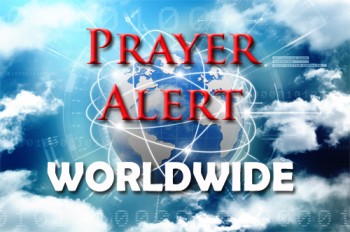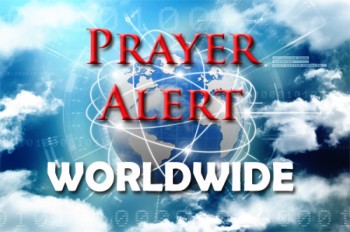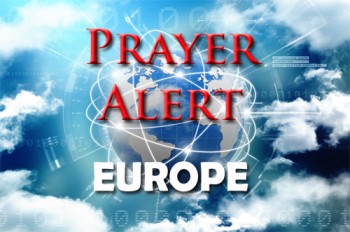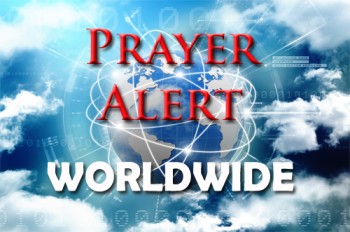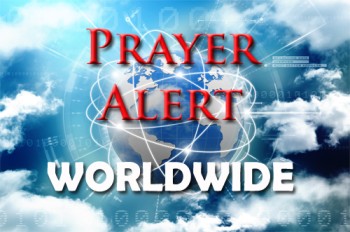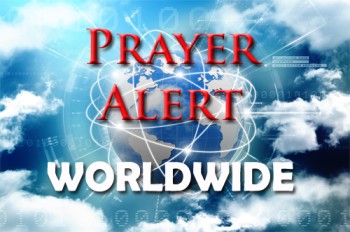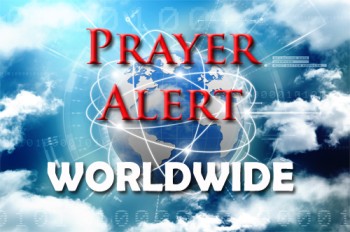Displaying items by tag: Africa
Africa: Gospel spreading at ‘explosive’ rate'
At the World Evangelical Alliance general assembly in Seoul, researcher Jason Mandryk from Operation World revealed that evangelical Christianity is growing faster in Africa than anywhere else in the world. In 1960 evangelicals comprised 8% of global Christians; today, with around 650 million believers, they exceed 25 percent. Nearly 70% of global Christian growth now occurs in Africa, where vibrant churches thrive amid rapid urbanisation and strong family life. Mandryk noted that while Western growth is modest, Africa, Asia and Latin America are reshaping the face of Christianity. Yet he warned that discipleship, leadership training and moral integrity must remain priorities if this expansion is to mature. David Tarus of the Association of Evangelicals in Africa said 90% of African pastors lack formal theological training, calling for education to reach local communities rather than relying on institutions. Both leaders urged clarity, humility and renewed holiness as the movement’s influence widens. The shift, Mandryk said, shows that the 'future of Christianity' has already arrived - rooted in the Global South. See
Nigeria and South Africa removed from global ‘grey list’
Nigeria, South Africa, Mozambique, and Burkina Faso have been removed from the Financial Action Task Force’s (FATF’s) global ‘grey list’, marking a crucial milestone in Africa’s financial integrity efforts. Once seen as high-risk for money laundering and terrorist financing, these nations have implemented sweeping reforms which have restored investor confidence and strengthened global partnerships. Nigeria’s tighter oversight of mobile money and anti-money-laundering laws, and South Africa’s expanded powers for financial regulators, have begun rebuilding trust in governance and transparency. Mozambique and Burkina Faso have improved their ability to track illicit cross-border transactions linked to armed groups. The delisting signals international recognition of progress - but it also serves as a reminder that vigilance and accountability must continue. For ordinary citizens, these reforms bring promise of greater economic stability, job creation, and stronger consumer protection: neighbouring countries could experience a confidence rebound, especially in attracting greater international investment.
Collision involving multiple vehicles on Uganda highway kills 46 people
At least 46 people have died following a devastating collision on Uganda’s Kampala-Gulu Highway, one of the country’s busiest roads. The crash occurred shortly after midnight near Kiryandongo when two buses travelling in opposite directions attempted to overtake other vehicles simultaneously, colliding head-on with a truck and a car. Initial reports suggested a higher death toll of 63 before police revised the figures as rescue operations progressed. The Uganda Police Force said many victims were found unconscious at the scene and urged motorists to avoid dangerous overtaking, which remains one of Uganda’s leading causes of road fatalities. Red Cross spokesperson Irene Nakasiita described the wreckage as “too gruesome to share,” with many victims suffering severe injuries and broken limbs. The tragedy highlights Uganda’s worsening road safety record, with more than 5,000 people killed in crashes last year—a rise for the third consecutive year. Authorities have launched an investigation while emergency teams continue assisting survivors and families.
Spain: a different approach to Africa and to migrants
In contrast to many Western nations, Spain is charting an independent path on migration and relations with Africa. While the USA, UK, France, and Germany are reducing development aid, prime minister Pedro Sánchez is deepening his country’s engagement with Africa through investment, diplomacy, and dialogue. The socialist-led government’s strategy emphasises shared prosperity, education, and sustainable growth, reflecting Madrid’s belief that Europe and Africa ‘form part of the same geopolitical space’. Alongside this vision, Spain continues to experience migration pressures, with 45,000 crossing from Africa to Spain or the Canary Islands in 2024. Yet unlike many European leaders, Sánchez acknowledges migrants’ contributions and backs ‘safe, orderly, and regular’ mobility schemes such as ‘circular migration agreements’ which give West Africans short-term visas to come to Spain for limited periods of seasonal work, mainly in agriculture, and then return. By coupling realism with empathy, Sánchez is seeking to balance security with solidarity, presenting a model of cooperation rooted in dignity, opportunity, and mutual benefit.
South Africa: Ramaphosa still pursuing genocide case against Israel
Cyril Ramaphosa has reaffirmed that the new Gaza ceasefire will not alter his country’s genocide case against Israel at the International Court of Justice. Speaking before parliament, he said South Africa remains committed to pursuing justice, adding that ‘true reconciliation requires accountability’. Filed in December 2023, the case accuses Israel of committing genocidal acts in Gaza and has drawn support from countries including Spain, Ireland, Turkiye, and Colombia. The ICJ has already ordered provisional measures for Israel to prevent further atrocities and allow humanitarian aid, though compliance has been limited. With more than 67,000 Palestinians reported killed since October 2023, global human rights organisations are continuing to press for justice. South Africa also co-chairs the Hague Group, a coalition formed in January 2025 to hold Israel accountable through legal, diplomatic, and economic measures beyond the ICJ proceedings.
Madagascar: military takeover after president flees
Madagascar has plunged deeper into political turmoil after Colonel Michael Randrianirina announced that the military was seizing control of the nation, moments after parliament voted to impeach president Andry Rajoelina. He said that the armed forces would form a governing council and appoint a civilian-led government, suspending both the constitution and the constitutional court. The move followed weeks of youth-led protests over widespread poverty, power shortages, and corruption (see): a critical moment came on 11 October, when Colonel Randrianirina and soldiers from his elite CAPSAT unit joined the demonstrators and turned against the president. The crisis evokes painful memories of Madagascar’s history of coups, including the 2009 uprising that first brought Rajoelina to power. With 75% of citizens living in poverty, frustrations among the young have erupted into demands for reform and dignity. As soldiers and protesters fill the streets, Madagascar stands at a crossroads between renewed authoritarian rule and the hope for democratic renewal.
Burkina Faso: government arrests eight humanitarian workers
The military government of Burkina Faso has arrested eight employees of the Netherlands-based International NGO Safety Organisation (INSO), accusing them of ‘spying and treason’. The security minister claims that the group, which includes citizens from France, the Czech Republic, Mali, Senegal, and Burkina Faso, continued operating after a three-month ban for allegedly collecting sensitive security data without authorisation; allegedly they passed information harmful to national security to foreign powers. INSO, which specialises in providing safety support for humanitarian operations, categorically rejected the accusations, insisting that all data it gathers is public and used solely to protect aid workers. The arrests come amid Burkina Faso’s growing estrangement from Western nations and its realignment with Russia, along with Mali and Niger. The ruling junta continues to battle armed groups linked to al-Qaeda, while facing criticism from human rights organisations over alleged abuses by its forces and allied militias.
Madagascar: protests continue despite government dissolution
Madagascar is facing mounting unrest as protests continue despite president Andry Rajoelina’s decision to dissolve the government. The move, announced on state television, was intended to ease tensions following demonstrations over widespread water and power shortages. Rajoelina expressed sympathy to families of those killed and acknowledged administrative failings, yet protesters remain unsatisfied, demanding his resignation. Many argue that changing ministers is not enough, since the president himself holds ultimate responsibility. The demonstrations, largely led by Gen Z, represent one of the most serious challenges to Rajoelina’s leadership since his 2023 re-election. Authorities have responded with curfews in Antananarivo and other major cities, and police have repeatedly used teargas and fired rubber bullets at demonstrators. The UN has said that at least 22 have been killed and over 100 injured, though the government disputes these figures.
Kenya: turning a deadly weed into an eco-friendly innovation
Innovator Joseph Nguthiru has turned a personal challenge into an award-winning environmental enterprise. In 2021, he and classmates were stranded for hours on Lake Naivasha when water hyacinth, a weed that disrupts fishing, navigation, and irrigation worldwide, blocked their boat. That incident inspired their engineering project to convert the invasive plant into biodegradable products. Nguthiru envisioned ‘one problem solving another’, so launched HyaPak Ecotech Ltd to create eco-friendly alternatives to single-use plastics, including packaging bags and seedling wrappers. HyaPak has already removed over 700 kilograms of hyacinth and partnered with Kenya’s government in a programme to plant 15 billion trees over ten years. Nguthiru has also invented a solar dryer, reviving Kenya’s pyrethrum farming, and leads Adopt a River, which has cleared more than three tons of river waste while educating communities on climate action. He believes lasting change requires grassroots involvement, proving innovation and community engagement can drive sustainable solutions.
Nigeria: new chapter in global fuel trade with first export to USA
The massive 650,000-barrel-per-day Dangote refinery has delivered its first US gasoline export, signalling a new chapter in global fuel trade. The tanker Gemini Pearl discharged about 320,000 barrels of gasoline at Sunoco’s Linden facility in New York harbour, with Vitol purchasing the cargo from Switzerland-based Mocoh Oil and selling most of it to Sunoco. The shipment meets stringent US motor fuel standards, a key milestone for the refinery after many startup delays. Two more USA-bound cargoes are en route. While these exports demonstrate Dangote’s potential to reshape energy flows and reduce Nigeria’s reliance on fuel imports, further US deliveries may pause soon because the refinery’s gasoline unit is expected to undergo two to three months of repairs, according to an industry monitor. Meanwhile, the refinery has also begun direct fuel supplies to marketers in Nigeria, which potentially could put an end to the country's shortages. See

